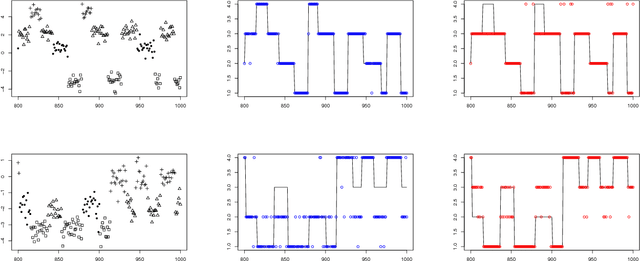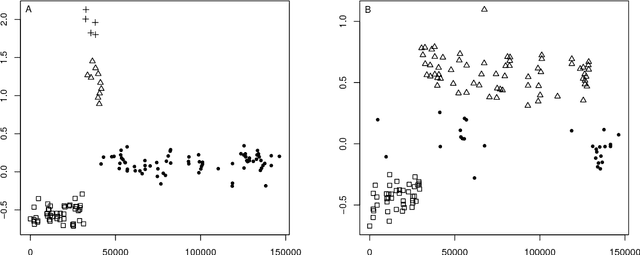Michele Guindani
Bayesian temporal biclustering with applications to multi-subject neuroscience studies
Jun 24, 2024



Abstract:We consider the problem of analyzing multivariate time series collected on multiple subjects, with the goal of identifying groups of subjects exhibiting similar trends in their recorded measurements over time as well as time-varying groups of associated measurements. To this end, we propose a Bayesian model for temporal biclustering featuring nested partitions, where a time-invariant partition of subjects induces a time-varying partition of measurements. Our approach allows for data-driven determination of the number of subject and measurement clusters as well as estimation of the number and location of changepoints in measurement partitions. To efficiently perform model fitting and posterior estimation with Markov Chain Monte Carlo, we derive a blocked update of measurements' cluster-assignment sequences. We illustrate the performance of our model in two applications to functional magnetic resonance imaging data and to an electroencephalogram dataset. The results indicate that the proposed model can combine information from potentially many subjects to discover a set of interpretable, dynamic patterns. Experiments on simulated data compare the estimation performance of the proposed model against ground-truth values and other statistical methods, showing that it performs well at identifying ground-truth subject and measurement clusters even when no subject or time dependence is present.
Generalized Species Sampling Priors with Latent Beta reinforcements
Aug 01, 2014



Abstract:Many popular Bayesian nonparametric priors can be characterized in terms of exchangeable species sampling sequences. However, in some applications, exchangeability may not be appropriate. We introduce a {novel and probabilistically coherent family of non-exchangeable species sampling sequences characterized by a tractable predictive probability function with weights driven by a sequence of independent Beta random variables. We compare their theoretical clustering properties with those of the Dirichlet Process and the two parameters Poisson-Dirichlet process. The proposed construction provides a complete characterization of the joint process, differently from existing work. We then propose the use of such process as prior distribution in a hierarchical Bayes modeling framework, and we describe a Markov Chain Monte Carlo sampler for posterior inference. We evaluate the performance of the prior and the robustness of the resulting inference in a simulation study, providing a comparison with popular Dirichlet Processes mixtures and Hidden Markov Models. Finally, we develop an application to the detection of chromosomal aberrations in breast cancer by leveraging array CGH data.
 Add to Chrome
Add to Chrome Add to Firefox
Add to Firefox Add to Edge
Add to Edge